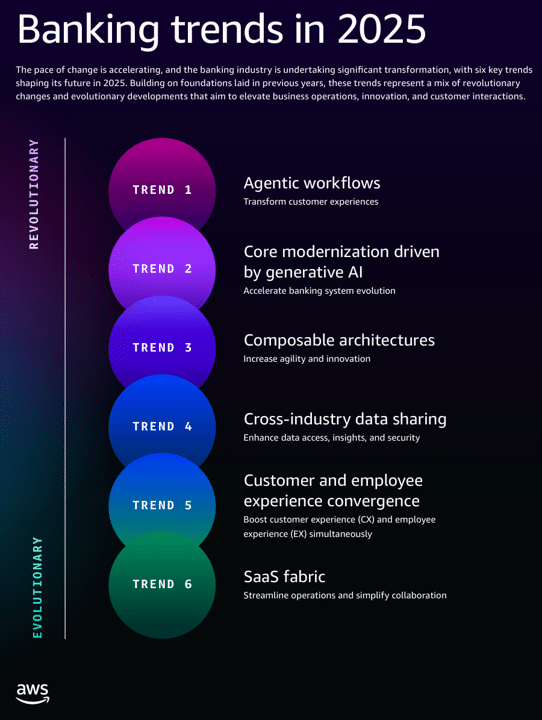Agentic AI is the number one trend shaping banking in 2025
Agentic AI, such as Google Agentspace, refers to artificial intelligence systems that operate autonomously, perceive their environment, set goals, plan actions, and execute those plans without continuous human intervention.
Unlike traditional AI models that rely on predefined inputs and outputs, agentic AI can proactively make decisions, adapt to new information, and refine its strategies over time.
This technology is gaining traction across industries, from marketing and customer service to financial services and enterprise automation. Companies like OpenAI, Google, and Microsoft are developing agentic AI tools that can conduct multi-step research, manage workflows, and even interact with external applications to complete tasks.
Agentic AI is poised to transform banking by introducing autonomous decision-making, proactive customer engagement, and intelligent risk management. Some of the biggest opportunities include:
Hyper-Personalised Customer Support AI agents can analyse customer behaviour and financial history to provide tailored recommendations, detect intent, and even anticipate needs before customers ask.
Fraud Detection & Risk Management By continuously scanning transaction patterns, Agentic AI can identify anomalies and prevent fraud in real time, reducing financial losses and enhancing security.
Automated Compliance & Regulatory Adherence AI-driven systems can autonomously monitor transactions, detect compliance risks, and adjust operations to align with evolving regulations, ensuring financial institutions remain compliant.
Intelligent Loan Processing & Credit Decisions AI agents can assess creditworthiness by analysing vast datasets, streamlining loan approvals, and reducing manual intervention, making lending more efficient.
Proactive Financial Advisory Services Instead of reactive banking, AI-powered advisors can suggest investment opportunities, optimise savings strategies, and help customers manage their finances more effectively.
Seamless Product Adoption & Upselling AI agents can detect spending patterns and recommend relevant financial products, such as multi-currency accounts or investment opportunities, improving customer engagement.
Operational Efficiency & Cost Reduction Banks can automate repetitive tasks, optimise workflows, and reduce overhead costs by integrating AI-driven automation across various banking functions.
Agentic AI is not just about automation—it’s about creating intelligent, adaptive banking experiences that enhance efficiency, security, and customer satisfaction.

Whilst its good news for driving efficiency its bad news for jobs and the economy
Agentic AI is projected to disrupt 2–5 million Australian jobs by 2030, primarily affecting white-collar sectors such as finance, insurance, law, and education, leading to significant salary contractions and economic challenges.
The finance sector is expected to lose 30–40% of its workforce, equating to 120,000 to 180,000 jobs, while administrative roles could see up to 50% reductions, indicating a concentration of AI’s impact on routine and data-heavy jobs.
On the flipside, Australia’s technology sector has seen significant growth, with the workforce now surpassing one million people in 2024, a 60% increase over the last decade. However, despite this expansion, the country faces a critical shortage of tech professionals needed to meet future industry demand. According to the Australian Computer Society’s (ACS) latest Digital Pulse report, an estimated 1.3 million additional tech workers will be required by 2030 to sustain the sector’s continued growth.
Wage losses across the economy are however anticipated to decrease consumer spending power, resulting in reduced tax revenues and increased financial strain on households, which may lead to defaults and a decline in the housing market.
The anticipated job displacement may exacerbate inequality and social unrest, potentially fuelling populist movements and calls for policy innovations such as Universal Basic Income (UBI) trials and AI productivity taxes.
The housing market is expected to experience significant pressure, with property prices potentially decreasing by 10% to 30% in major metropolitan areas, while rental markets may see volatility depending on regional economic conditions.
Innovating ahead of the curve with Moroku.
Moroku offers numerous innovative solutions that can help banks, credit unions, and non-bank lenders navigate the disruptions brought by Agentic AI and digital transformation.
Moroku emphasises responsible AI deployment, ensuring that financial institutions integrate AI in a way that enhances customer success rather than just cutting costs. We partner with Google and their Agentspace, produce to drive autonomous service
Moroku Odyssey applies game theory to financial services, making banking more interactive and engaging. This approach helps customers build better financial habits while allowing banks to foster deeper relationships.
Moroku’s AI priming system refines data models using transactional and behavioural data from core banking systems and open banking. This enables financial institutions to deliver more personalised and predictive services, whilst using less AI compute resources.
Moroku has launched a BaaS platform tailored for Australian community banks and credit unions. This platform integrates Moroku Money’s digital engagement tools with a cloud native core banking solutions, helping smaller financial institutions compete effectively.
By focusing on customer success rather than cost-cutting, financial institutions can differentiate themselves in an increasingly digital landscape.
By adopting Moroku’s solutions, banks, credit unions, and non-bank lenders can prepare for AI-driven disruptions while maintaining strong customer relationships and ethical AI practices.